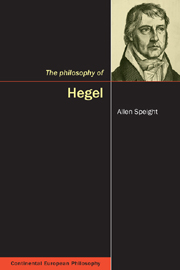Book contents
- Frontmatter
- Contents
- Acknowledgements
- Abbreviations
- Introduction
- 1 German Idealism and the young Hegel
- 2 The Phenomenology of Spirit
- 3 The Logic and Hegel's system
- 4 Ethics and politics
- 5 Hegel and the narrative task of history
- 6 Art, aesthetics and literary theory
- 7 Religion and philosophy
- Notes
- Guide to further reading
- Bibliography
- Index
1 - German Idealism and the young Hegel
- Frontmatter
- Contents
- Acknowledgements
- Abbreviations
- Introduction
- 1 German Idealism and the young Hegel
- 2 The Phenomenology of Spirit
- 3 The Logic and Hegel's system
- 4 Ethics and politics
- 5 Hegel and the narrative task of history
- 6 Art, aesthetics and literary theory
- 7 Religion and philosophy
- Notes
- Guide to further reading
- Bibliography
- Index
Summary
The story of the “young Hegel” – Hegel in the earliest years of his development before the writing of the Phenomenology of Spirit – is one that has been told from a number of different and not necessarily incompatible perspectives: some have read it as the story of a young man focused on political issues and the task of being a philosophical educator of some sort, while others have read it as the story of a former seminarian whose concern for essentially theological issues gave way to a critical stance on existing forms of religion and moved him to systematic philosophy. However partial these readings may be, they share a correct view: an exploration of the philosophical development of the young Hegel is a crucial point of departure for anyone trying to make sense of who Hegel became and what we can take Hegelianism to be as a result.
In this chapter, I shall take up the question of Hegel's philosophical development with two particular concerns in mind: (a) the general intellectual background of the post-Kantian world that is the common framework for German Idealism and early German Romanticism, and (b) Hegel's interest in the issues posed within that intellectual world. (The small German town of Jena turns out to be unusually important for both.) What will emerge at the end of this period is a Hegel whose philosophical views have been shaped importantly by a concern with the range of questions of interest to idealists and Romantics both, but whose individual contributions have begun to look distinctive against that general intellectual environment.
- Type
- Chapter
- Information
- The Philosophy of Hegel , pp. 9 - 26Publisher: Acumen PublishingPrint publication year: 2008



